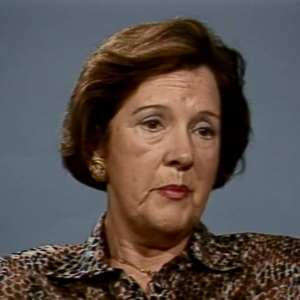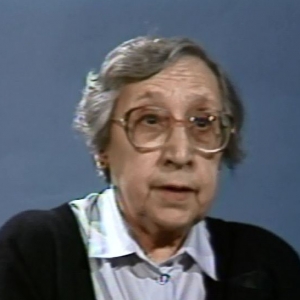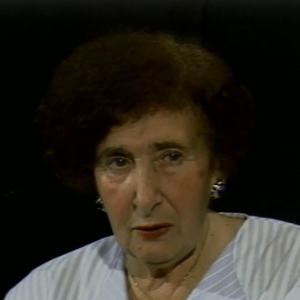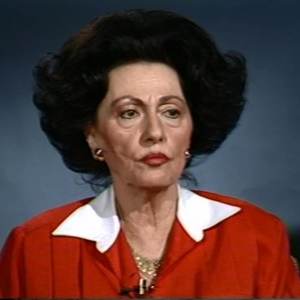Judy Lysy (everyday life)
Judy describes how the relationship between Jewish and non-Jewish citizens changed.
Judy Lysy (nee Singer) was born in Kosice, Czechoslovakia on February 27, 1928. Her father Morris Singer owned a flour mill. Her Mother’s name was Ella Singer. Judy’s also had one sister, Rosa, who was two years older than her. Judy and Rosa had a happy childhood and attended a Jewish private school.
German units walked into her community on March 19th, 1944. After that, Jewish lives became very restricted. Jews had to wear yellow stars on their clothing. They had to give up their jewelry and valuables. By the fourth week of German occupation, the Jews in Judy’s community were forced to leave their homes and relocate to a ghetto in a brick factory on the outskirts of the town.
In the ghetto, Judy became a nurse’s assistant, and her sister became a kindergarten teacher. After four weeks in the Ghetto, Judy and her family were forced into cattle cars and were transported to Auschwitz. Upon arrival in the camp, Judy volunteered to translate the German officer’s commands as they selected arrivals for work or gas chambers. Those selected were forced to strip naked, were shaved, directed to showers, and then taken into barracks. Rollcall took place in the morning and evening and the whole camp had to stand for hours while they were counted.
Judy’s barrack had typhoid fever and the German officers did not want them to mingle with other people. Because of this they were not taken to work but had to sit outside the barracks during the daytime doing nothing.
After she had been at Auschwitz for a few weeks, Dr. Mengele came with some German officers and asked if anybody would like to give blood in exchange for a piece of bread and a piece of wurst. Judy and her sister volunteered. A few days later, Judy got typhoid fever. Her mother tried to hide her illness but eventually Judy got so ill that she could no longer stand on her own. She was taken to a hospital where she was taken care of because one of the nurses was an old friend of Judy’s mother.
Then came the Selection, where people were picked out to be sent for work out of Auschwitz. Judy, her mother and her sister were afraid that they would be separated. Judy and her mother were sent to work, but her sister was not selected. Luckily, another sister pair was divided, and they were able to switch so that Judy’s sister came with them.
The family was taken by train to a factory called Zillerthal. This camp was much smaller than Auschwitz with only 40 women in one barrack. They also received more food: soup, bread and some potatoes. In Zillerthal, they also refused to work on Yom Kippur and other Jewish holidays. The Germans responded by beating them. Nearby was a camp of Italian and French war prisoners and when they heard the women screaming and the crying, they started to shake the fences and screamed and yelled until the Germans stopped beating them.
Judy and her sister were later sent to another camp to measure propellers of German planes. They were there a short while before they were forced to march to Mauthausen where a non-Jewish man told Judy to volunteer for sewing. But with the advance of the Americans, the Germans buried their rifles, adopted civilian clothing and fled the camp. Soon after, the camp was liberated by the Americans.
Judy arrived in Canada in 1952.
Judy Lysy (everyday life)I understood that jealousy – for succeeding, for not succeeding… both ways it was no good to them.
Testimony to discover
-
Hiding

Esther Bem
Esther Bem describes her life and death encounter with a German SS officer.
Listen -
Liberation

Anna Constam
Anna Constam describes life in Holland, in the aftermath of the Holocaust.
Listen -
Ghetto

Luba Drew
Luba Drew describes her deportation from the Łódź Ghetto to Auschwitz-Birkenau.
Listen -
Camp

Regina Goldfinger
Regina Goldfinger describes the conditions in the women’s barracks of Auschwitz-Birkenau.
Listen
Educators & Students
Educational guides
Check resources